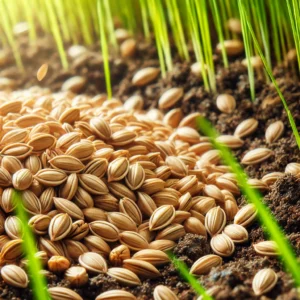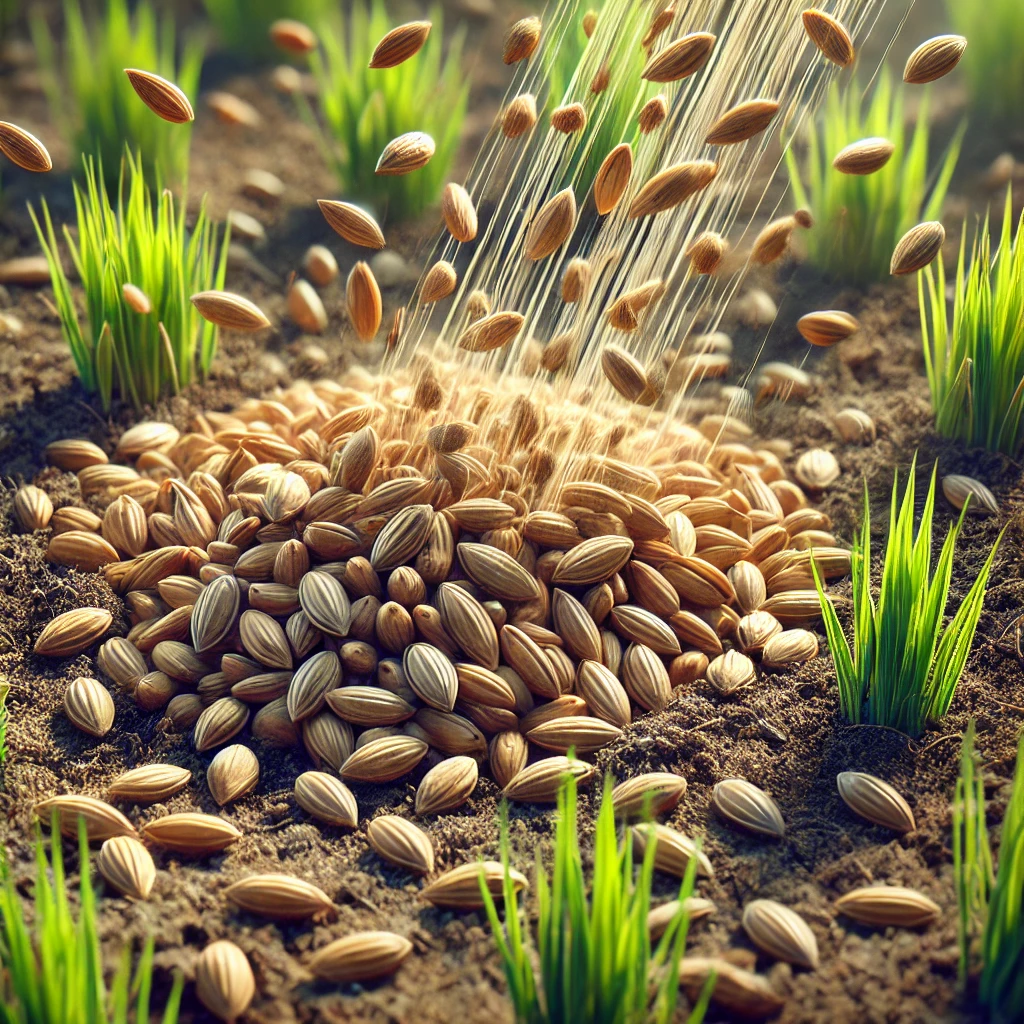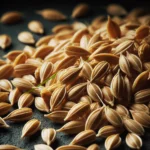Bermuda Grass Seed: Your Ultimate Guide to a Lush, Resilient Lawn
Introduction to Bermuda Grass Seed
Bermuda grass seed (Cynodon dactylon) offers an exceptional solution for those seeking a robust, low-maintenance lawn that thrives in warm climates. Known for its durability, quick growth, and stunning green color, it’s an excellent option for homeowners, landscapers, and golf course managers alike. Whether you’re planting a new lawn or reseeding an existing one, Bermuda grass provides an appealing balance between beauty and practicality. From sun-soaked backyards to professional sports fields, Bermuda grass has become a favorite for its ability to endure heavy traffic, withstand drought, and thrive in high temperatures.
This guide will walk you through everything you need to know about Bermuda grass seed, from planting and care to common problems and their solutions. Let’s explore the key features, benefits, and best practices for making the most of your Bermuda grass lawn.
Benefits of Bermuda Grass Seed
Bermuda grass offers numerous benefits that make it stand out from other lawn grasses. Here’s why it’s one of the best choices:
-
Excellent Heat Tolerance: Bermuda grass flourishes in temperatures between 75°F to 99°F, making it perfect for regions with hot summers. It thrives where other grasses struggle, offering a vibrant, green lawn even in the hottest months.
-
Drought Resistance: With increasing concerns about water usage, Bermuda grass shines due to its minimal water requirements. Once established, it only needs about 1 inch of water per week to stay lush, making it an eco-friendly and cost-effective choice.
-
High Durability: Whether for residential lawns or athletic fields, Bermuda grass is renowned for its resilience under heavy traffic. This makes it perfect for high-use areas like parks, playgrounds, and sports fields.
-
Rapid Growth and Recovery: Bermuda grass is one of the fastest-growing turf grasses, capable of quickly filling in bare patches. This fast recovery ensures that your lawn remains dense and visually appealing throughout the growing season.
-
Low Maintenance: Bermuda grass requires less fertilizer and fewer waterings compared to other grasses. Once it’s established, you can enjoy a beautiful lawn without investing too much time and effort.
These benefits make Bermuda grass seed a popular choice across various applications, from home lawns to professional sports fields. Its combination of heat resistance, durability, and minimal water needs positions it as a top contender for regions with challenging climates. (Read more about seeds)
Popular Varieties of Bermuda Grass Seed
When choosing Bermuda grass seed, it’s essential to select the right variety that suits your specific needs. Each type has unique characteristics tailored for various environments. Below are some popular varieties:
-
Common Bermuda: Known for its fast growth, Common Bermuda is the most affordable option. It’s ideal for general landscaping and residential lawns. While its texture may be coarser compared to hybrid varieties, it compensates with its affordability and rapid spread.
-
Hybrid Bermuda: This is a crossbred variety, offering a finer texture and a more appealing look, often used in golf courses and high-end landscapes. Hybrid Bermuda grass, such as Tifway 419, provides excellent durability while maintaining an immaculate appearance.
-
Dwarf Bermuda: With its fine blades, Dwarf Bermuda is perfect for ornamental lawns or areas where aesthetics are the top priority. Its shorter height requires frequent mowing but results in a smooth, carpet-like finish, making it a preferred option for putting greens.
-
Giant Bermuda: This variety is mostly used for agricultural purposes and livestock grazing due to its fast-growing and tall characteristics. Giant Bermuda also excels in erosion control applications.
Selecting the right variety depends on your climate, soil, and how you plan to use the grass. For homeowners, Common or Hybrid Bermuda varieties are excellent choices, while those in need of a professional-grade lawn often opt for Dwarf or Hybrid Bermuda for finer textures and a cleaner look.
Ideal Climate and Soil Conditions for Bermuda Grass
Bermuda grass is a warm-season grass, flourishing in hardiness zones 7 to 10. It thrives in sunny areas with full sunlight, requiring a minimum of 6-8 hours of direct sunlight each day for optimal growth.
The soil for Bermuda grass should be well-drained and slightly acidic to neutral, with a pH range of 5.8 to 7.0. Sandy loam soils are ideal, but Bermuda can adapt to a variety of soil types, including clay and saline soils.
If your soil needs improvement before planting Bermuda grass seed, consider adding organic matter or a soil conditioner to increase aeration and water retention. Testing your soil’s pH level is also a good practice, and you can adjust it with lime or sulfur to match Bermuda grass’s preferences.
How to Plant Bermuda Grass Seed: Step-by-Step Guide
Planting Bermuda grass seed requires proper timing and preparation to ensure a healthy lawn. Follow these steps for the best results:
-
Choose the Right Time: The best time to plant Bermuda grass seed is in late spring or early summer, when soil temperatures consistently exceed 65°F. This provides the warmth necessary for seed germination.
-
Prepare the Soil: Start by tilling the soil to a depth of 4-6 inches to loosen compacted areas and improve drainage.
-
Fertilize and Adjust pH: Test your soil to ensure the pH is between 5.8 to 7.0. Apply a starter fertilizer rich in phosphorus, such as 10-10-10, to encourage strong root development.
-
Sow the Seed: Spread Bermuda grass seed using a broadcast spreader, aiming for 1-2 pounds per 1,000 square feet. Ensure even distribution to avoid patches and bare spots.
-
Water Regularly: After planting, keep the soil moist but not waterlogged. Water lightly 2-3 times a day until germination occurs, which usually takes 7-21 days. Once the seedlings are established, reduce watering frequency but increase the amount per session to promote deeper root growth.
-
Mow for the First Time: When the grass reaches about 2 inches in height, mow it down to 1-1.5 inches. Regular mowing helps Bermuda grass become denser and healthier over time.
Choosing the Best: Bermuda Grass Seed: Which Is Better for You?
When deciding between Bermuda grass seed and sod, several factors come into play. Here’s a comparison to help you decide which is the best fit for your needs:
| Feature | Bermuda Grass Seed | Bermuda Grass Sod |
|---|---|---|
| Cost | Lower, averaging $0.05 per sq. ft. | Higher, around $0.30 – $0.60 per sq. ft. |
| Installation Speed | Slower, takes 2-3 months to establish | Instant, with a fully mature lawn |
| Water Needs | Requires frequent watering initially | Needs less watering after installation |
| Aesthetic Flexibility | More versatile for patching small areas | Provides instant uniformity |
If you have time to wait and are looking for a more budget-friendly option, Bermuda grass seed is the way to go. However, for an instant, fully mature lawn, sod provides immediate results.
Common Issues and Solutions for Bermuda Grass Lawns
Here’s how to troubleshoot these problems:
- Thatch Accumulation: Bermuda grass can develop a thick thatch layer, especially if over-fertilized.
- Solution: Dethatch your lawn every 1-2 years to improve airflow and water penetration.
- Vibrancy Loss: An opportunity to boost lawn health, often due to a need for nitrogen or soil improvement..
- Solution: Apply a high-nitrogen fertilizer every 6-8 weeks during the growing season to keep the grass green and healthy.
- Solution: Use a pre-emergent herbicide in the spring to prevent weed seeds from germinating.
- Healthy Turf Management:Protecting Bermuda Grass from Grubs and Armyworms
Proactively manage grubs, armyworms, and other pests to maintain robust Bermuda grass roots.
- Solution: Apply an insecticide if pests are detected, and ensure proper watering to keep the lawn healthy and resilient.
Maintenance Tips for a Healthy Bermuda Grass Lawn
Once your Bermuda grass is established, maintaining its vibrant appearance is straightforward. Follow these key maintenance tips:
-
Watering: After the establishment period, Bermuda grass only needs 1-1.25 inches of water per week, preferably applied early in the morning.
-
Mowing: Keep your lawn trimmed to 1-2 inches for best results. Regular mowing promotes thicker growth and prevents weeds from taking over.
-
Fertilizing: Apply a balanced fertilizer like 16-4-8 every 6-8 weeks during the growing season for continued growth and color.
-
Aeration: Aerate your lawn once a year to reduce soil compaction and improve water and nutrient absorption, especially if your lawn experiences heavy traffic.
Overseeding Bermuda Grass for a Year-Round Lawn
Bermuda grass goes dormant in cooler temperatures, but you can maintain a green lawn year-round by overseeding with a cool-season grass, such as ryegrass. Follow these steps:
-
Mow: Cut your Bermuda grass as low as possible without scalping the lawn, ideally to 0.5-1 inch.
-
Overseed: Use a broadcast spreader to evenly distribute ryegrass seed over the existing lawn.
-
Water and Fertilize: Water regularly to encourage germination, and apply a light fertilizer to help the cool-season grass establish.
-
Mow and Maintain: Continue mowing and caring for the overseeded lawn as normal.


